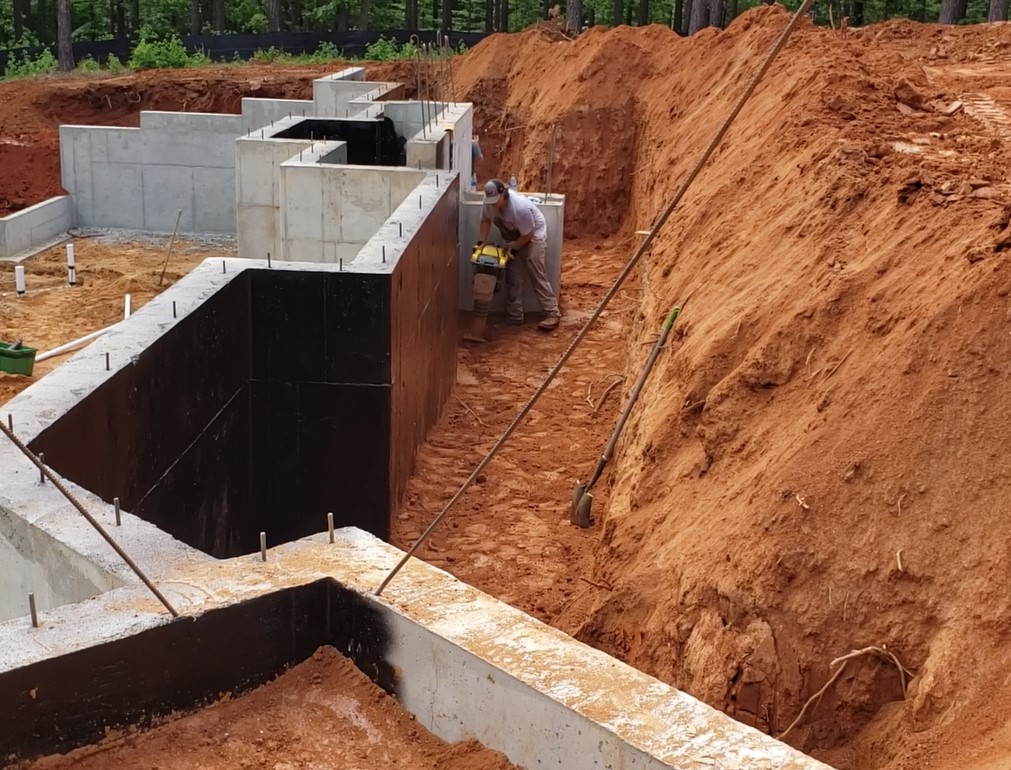For service in the Atlanta, Georgia area contact or call us:
Residential Drainage Problems
Grading, A Simple Solution
Residential drainage problems are a nuisance. A wet, soggy yard is a common drainage problem in Atlanta.
Your yard is wet, and it has not rained in days. Your yard is unusable. It usually takes several days for the yard to dry and be used by the kids. Heavy rains cause the basement foundation walls to become damp.
What is causing this condition? The abundance of water outside and inside prevents my family from enjoying our home and yard. Even the pets track mud into the house. And the standing water breeds mosquitos. What can I do?
Improper Grading,
Creating Positive Flow
Residential drainage problems often start with improper grading around the foundation of the house. The ground next to the house is flat and at places slope towards the house. So, the water just sits there and will either over time dry up or seep through the foundation walls into the basement or crawl space.
Grading contractors and landscape companies do not take necessary precautions to create a positive flow away from the foundation of the house. Even untrained individuals realize that water flows downhill and follows a path of least resistance. Yards sloped toward the house will always create a drainage problem for the homeowner.
Georgia Red Clay are typical soils in Georgia. Clay soils hold water and expand. Water moves slowly through clay soils. Inadequate grading in conjunction with the “Georgia Red Clay” is a recipe for water problems around foundations.

What Causes Residential Drainage Problems?
The construction of a house starts with excavation for the foundation of the basement. The excavation is approximately 4 feet over-excavation to allow the foundation contractor to construct the forms for the foundation walls. Once the contractor pours the concrete and the forms are removed, he backfills around the walls. Backfill which is not properly compacted will settle and sink next to the foundation.
The landscaper plants beautiful shrubs around the house, not realizing the backfilled material is loose and will settle. After several months, the ground sinks several inches, just enough that stormwater will not drain away from foundation walls.
The stormwater slowly saturates the loose soil and seeps down the concrete foundation wall. Most concrete develops tiny cracks. Water finds the cracks and seeps through the wall. The basement walls become wet from the water and stay damp for long periods of time.
Residential Building Codes specify that the grade next to the house has a positive slope away from the house. The ground should drop a minimum of 6 inches in the first 10 feet measured perpendicular to the house. This will usually account for any settlement of the loose soil.
Correct Improper Slopes
in Residential Drainage Problem Areas
Yards without landscaping are relatively easy to correct by re-grading the yard. This requires hauling in additional fill material to the site and placing the material along the foundation.
Landscaped yards require much more work and more expense. First, remove the shrubbery and plants in areas without proper slope. Next, fill the low areas with fill dirt and replant the shrubbery.
The lack of drainage structures such as catch basins and drop inlets contributes to the problem. Installation of drainage structures can help solve drainage issues. Properly placed inlets will solve many problem areas and eliminate the need for removing the shrubbery.
Rain Gardens
Rain gardens can be used to soak up wet areas in your yard. They are usually depressed areas that collect rain water from roofs, driveways or streets. The garden is planted with grasses and flowering perennials which are cost effective and beautiful. The Environmental Protection Agency has information on rain gardens. A rain garden might be helpful in your yards.
Consult with Your Drainage Engineer
Seek the Services of a Forensic Hydrologist
Your drainage engineer may recommend French drains. French drains are another way to collect standing water and pipe it away from the house.
Speak with your builder and landscape contractor about the poorly graded yard. A good builder will stand behind his work and correct the problem.
Consult with a drainage specialist. He will provide solutions to solve your residential drainage problem.
Additional Stormwater Drainage Articles
Find a Drainage Specialist for drainage consultation
Yard Drainage Problems Devalues Property
Simple Solutions to Residential Drainage Problems
Learn the Benefits of Stormwater Drainage Swales
Solving Wet, Soggy Yard Problems
Common Drainage Problems of Homeowners
Preventing Crawl Space Drainage Issues
Do you have a Groundwater Spring on your Property?
Stormwater Damage from the Property Upstream
Stormwater Utilities and Detention Ponds
Forensic Hydrologist Evaluates Stormwater Runoff
Hydrology Expert Contact Information
Additional Services by Atlanta Engineering Services
G-ZNJ8QW23K9
